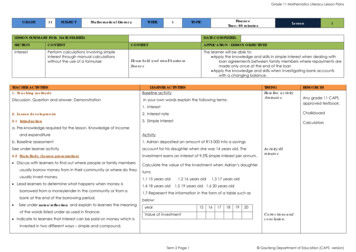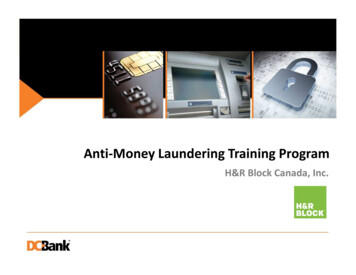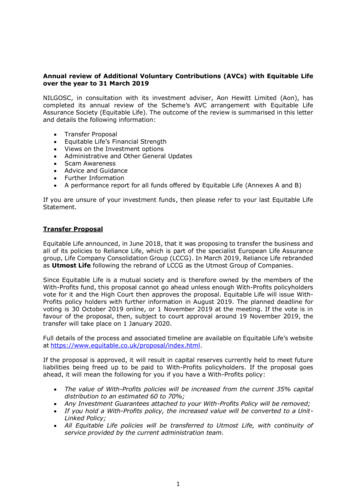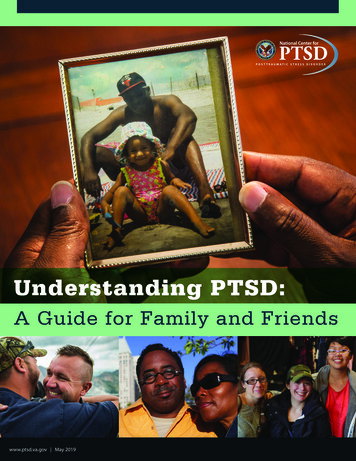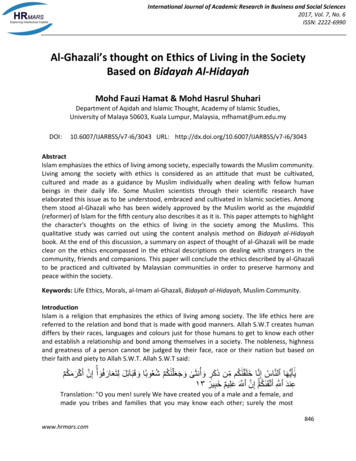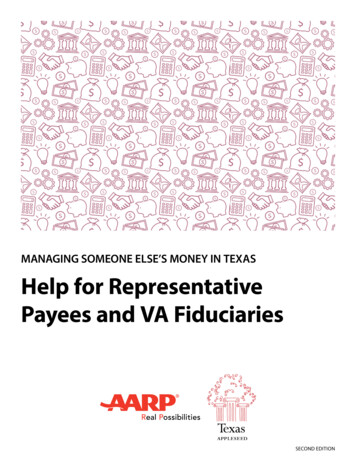
Transcription
MANAGING SOMEONE ELSE’S MONEY IN TEXASHelp for RepresentativePayees and VA FiduciariesSECOND EDITION
About Texas Appleseed & AARPTexas Appleseed is a public interest justice center. Texas Appleseed works to change unjust lawsand policies that prevent Texans from realizing their full potential. For more information, visittexasappleseed.org.AARP, with its nearly 38 million members in all 50 states and the District of Columbia, Puerto Rico,and U.S. Virgin Islands, is a nonpartisan, nonprofit, nationwide organization that helps people turntheir goals and dreams into real possibilities, strengthens communities, and fights for the issues thatmatter most to families, such as health care, employment and income security, retirement planning,affordable utilities, and protection from financial abuse. In Texas, AARP has 2.3 million members. Tolearn more, visit aarp.org/tx.This Guide was adapted from the Consumer Financial Protection Bureau’s (the “CFPB’s”) ManagingSomeone Else’s Money guides. Texas Appleseed and AARP prepared this Guide to include informationabout Texas state law and resources. The CFPB has not reviewed or approved the content in thisGuide, and the CFPB does not necessarily endorse the final product.We would like to thank Baker Botts L.L.P. for its pro bono support in creating and updating this seriesof guides, including team leaders Justice Tom Phillips and Keri Brown, and team members WadeAllison, Benjamin Cohen-Kurzrock, Kate Dickinson, Emily Heasley, and Katie McEvilly.We would also like to thank our Advisory Committee, whose expert guidance contributed greatly tothe final guides: Bruce Bower, deputy director, Texas Legal Services Center; Judge Christine Butts,Harris County Probate Court No. 4; Bob Jackson, director, AARP Texas; Dean Helen Jenkins, SouthTexas College of Law; and David Slayton, executive director, Texas Office of Court Administration.HELP FOR REPRESENTATIVE PAYEES AND VA FIDUCIARIES3
4MANAGING SOMEONE ELSE’S MONEY IN TEXAS
What’s InsideAbout Texas Appleseed & AARP3Why read this Guide?7Let’s review some vocabularyWhat is a fiduciary?Representative payee or VA fiduciary questions9910Four basic duties of a fiduciaryDuty 1: Act only in Roberto’s best interestDuty 2: Manage Roberto’s money carefullyDuty 3: Keep Roberto’s money separateDuty 4: Keep good records and report as required1111111314More things you should knowOther fiduciariesProblems with family or friends161616Watch out for financial exploitationCommon signs1717Be on guard for consumer scamsHow can I protect Roberto from scams?1919Where to go for helpLocal and state agenciesMedicaid/medical assistancePolice or sheriffFederal agenciesLegal helpAccounting help21212325252627HELP FOR REPRESENTATIVE PAYEES AND VA FIDUCIARIES5
You may want to read our other guides.Help for Trustees Under a Revocable Trust is ahelpful resource for a person serving as a Texastrustee.MANAGING SOMEONE ELSE’S MONEY IN TEXASHelp for Trustees Undera Revocable TrustHelp for Court-Appointed Guardians of the Estateis a helpful resource for a person appointed by acourt to serve as guardian for another person.MANAGING SOMEONE ELSE’S MONEY IN TEXASHelp for Court-AppointedGuardians of the EstateHelp for Agents Under a Power of Attorney is ahelpful resource for a person serving as an agentunder a power of attorney.MANAGING SOMEONE ELSE’S MONEY IN TEXASHelp for Agents Undera Power of AttorneyHelp for Supporters Undera Supported Decision-MakingAgreement6Help for Supporters Under a Supported DecisionMaking Agreement can help answer questionsa supporter may have about his or her role andresponsibilities.MANAGING SOMEONE ELSE’S MONEY IN TEXAS
Why read this Guide?Like many people, you may never have been a representative payee or U.S. Department of VeteransAffairs (“VA”) fiduciary before. That’s why we created Managing Someone Else’s Money in Texas: Helpfor Representative Payees and VA Fiduciaries. This Guide will help you understand what you can andcannot do in your role as a representative payee or VA fiduciary. In both these roles, you are afiduciary. For this Guide, a fiduciary is anyone named to manage money or property for someoneelse. You’ll find brief tips to help you avoid problems and resources for finding more information.This Guide is for family and friends already serving as a representative payee or VA fiduciary, not forprofessionals or organizations. If you want to learn about how to become a representative payee orVA fiduciary, this Guide is not designed for you. You should contact the federal agency that pays thebenefits.This Guide does not give you legal advice. If you have questions about your responsibilities, talk to alawyer, read our other guides or visit the “Seniors and the law” webpage at texaslawhelp.org/article/seniors-and-law.HELP FOR REPRESENTATIVE PAYEES AND VA FIDUCIARIES7
How you might have become a representativepayee or VA fiduciaryYour family member or friend receives Social Security or VAbenefits. For this Guide, let’s call him Roberto. The Social SecurityAdministration has named you as representative payee forRoberto, or the Department of Veterans Affairs has named you asRoberto’s VA fiduciary.You now have the duty and power to manage his Social Securityor Veterans Affairs benefit checks.In this role on Roberto’s behalf, the federal government gives youa lot of responsibility.Under the law, you are now a fiduciary with fiduciary duties.Manage Roberto’smoney and property.Follow your four fiduciaryduties, detailed on pages11-15.Payeeor VAfiduciaryRoberto8MANAGING SOMEONE ELSE’S MONEY IN TEXASYouWatch out for scamsand exploitation. Learnmore on pages 17-20.
Let’s review some vocabularyRepresentativepayeeVA fiduciaryA representative payee is the person appointed by a governmentagency, such as the Social Security Administration, theOffice of Personnel Management, or the Railroad RetirementAdministration, to manage the income benefits of a person whoneeds help managing those benefits.A VA fiduciary is the person appointed by the Department ofVeterans Affairs to manage the income benefits of a person whoneeds help managing those benefits.What is a fiduciary?Since you have been named to manage money or property for someone else as that person’sagent, you have a special relationship with that person. Texas law calls that relationship a fiduciaryrelationship, and you are the fiduciary. As Roberto’s fiduciary, you owe him a high duty of good faith,fair dealing, honest performance, and strict accountability. The law requires you to manage Roberto’smoney and property for his benefit, not yours. It does not matter if you are managing a lot of moneyor a little. It does not matter if you are a family member or not.The role of a fiduciary is a serious one and carries with it legal responsibilities. When you act as afiduciary for Roberto, you have four basic duties that you must keep in mind:1. Act only in Roberto’s best interest.2. Manage Roberto’s money and property carefully.3. Keep Roberto’s money and property separate from yours.4. Keep good records.As a fiduciary, you must be diligent, trustworthy, honest, and act in good faith. If you do not meetthese standards, you could be removed as a fiduciary, sued, or have to repay money. It is evenpossible that the police or sheriff could investigate you and you could go to jail. That’s why it’salways important to remember: It’s not your money!HELP FOR REPRESENTATIVE PAYEES AND VA FIDUCIARIES9
Representative payee or VA fiduciaryquestionsWhat is a representative payee or VA fiduciary?A government agency may appoint someone to manage income benefits for a person who needshelp managing those benefits.For example, the Social Security Administration, the Office of Personnel Management, and theRailroad Retirement Administration call the person who is appointed a representative payee. TheVA has a similar program, but the person appointed is called a VA fiduciary. State agencies may havesimilar arrangements. Each agency may have different rules and procedures. This Guide covers twoof the largest agencies, the Social Security Administration and the VA, but the duties described in thisGuide may be helpful to other representative payees.Since you have been appointed as Roberto’s representative payee, we will sometimes call you a “reppayee” for short. Roberto is the beneficiary.Once you are appointed as a rep payee or VA fiduciary, you must follow the basic fiduciary duties inthis Guide. Plus, you also must meet certain reporting requirements of the particular agency.What money does a representative payee or VA fiduciary manage?You only have authority to manage the benefit checks of the agency appointing you. You have nolegal authority to manage other property, financial affairs, or medical matters for Roberto. To controlother matters, you must have legal authority from another source, such as through a power ofattorney, trust agreement, or court appointment.Even if you are Roberto’s agent under a power of attorney, his trustee under a trust, or the guardianof his estate, you don’t have legal authority to manage his federal benefits checks. You still must beappointed representative payee or VA fiduciary by the agency paying the benefit.Am I personally liable for Roberto’s debts?No, you are not personally liable for Roberto’s debts or for decisions you make on his behalf unlessyou act beyond your authority or did not disclose that you were acting as Roberto’s agent.Do I have to serve as Roberto’s representative payee or VA fiduciary?No. You are not required to serve as a rep payee or VA fiduciary. You must let the government knowif that is the case so that the government can find someone else to serve.10MANAGING SOMEONE ELSE’S MONEY IN TEXAS
Four basic duties of a fiduciaryDuty 1: Act only in Roberto’s best interestBecause you are dealing with Roberto’s money, your duty is to make decisions that are best for him.This means you must ignore your own interests and needs as well as the interests and needs of otherpeople such as Roberto’s relatives who are not his dependents.To help act in Roberto’s best interest, follow these guidelines: Avoid conflicts of interest. A conflict of interest happens if you make a decision aboutRoberto’s money that may benefit someone else besides Roberto. As a fiduciary, you have astrict duty to avoid conflicts of interest—or even the appearance of a conflict of interest. Don’t borrow, loan, or give Roberto’s money to yourself or others. The VA may allow gifts incertain circumstances, but be sure to check with them first. Don’t pay yourself for your services. Only certain organizations or qualified individuals areallowed to charge a fee to serve as rep payee or VA fiduciary if the particular agency approvesit.Duty 2: Manage Roberto’s money carefullyAs Roberto’s fiduciary, you might pay bills or taxes, oversee bank accounts, pay for things he needs,and do other things to manage his benefits. You have a duty to manage Roberto’s money verycarefully. Use good judgment and common sense. As a fiduciary, you must be even more careful withRoberto’s money than you might be with your own!Follow these guidelines to help you make careful decisions: Make sure Roberto’s day-to-day needs for food, clothing, and shelter are met first. Onlythen should you spend money on Roberto’s medical, dental, and personal needs to improvehis daily living conditions or comfort, such as:HELP FOR REPRESENTATIVE PAYEES AND VA FIDUCIARIES11
»» improvements in his home or apartment;»» recreational activities, magazine subscriptions, cableTV;»» educational or training expenses, if they are neededto improve Roberto’s life; and»» car payments, if his other needs are met andRoberto needs or owns the car. Pay bills on time. Make sure bills are sent to you. Reviewbills and bank statements promptly.Avoid possible conflictsof interest.Sometimes people have goodintentions but do things theyshouldn’t. Because you arenow a fiduciary, you shouldavoid any conflicts of interest.Here are a few examples ofpossible conflicts of interest:Whose car is it?You used Roberto’s money tobuy a car. You use the car todrive him to appointments,but most of the time you driveit just for your own needs. Thismay be a conflict of interest.Should you do businesswith family?Roberto needs repair workin his apartment. You hireyour son and pay him fromRoberto’s money. This maybe a conflict of interest, eventhough the work was needed.It appears that you put yourpersonal interest to benefityour son in conflict withRoberto’s interests.12MANAGING SOMEONE ELSE’S MONEY IN TEXAS Protect unspent funds. After you pay Roberto’s regularexpenses, if money is left over, you must save it in afederally protected or state-insured interest-bearingaccount or U.S. savings bond. The interest earned alwaysbelongs to Roberto. Consider Roberto’s dependents. If Roberto has a spouseor dependent family members, consult the Social SecurityAdministration or the VA about whether you can use any ofhis money to pay for their needs. Protect Roberto’s money from creditors’ claims. The lawprotects Roberto’s benefits. Creditors are not allowed tolegally take his Social Security or VA funds, with certainexceptions. His bank generally must protect up to twomonths’ worth of benefits. But if Roberto owes a debt tothe federal government or for child or spousal support,special rules apply. Seek legal help if a debt collector suesRoberto. If Roberto has funds from other sources (forexample, pensions, gifts, savings), don’t mix them withhis Social Security or VA funds. Mixing funds may make itharder to protect Roberto’s Social Security and VA fundsfrom people who may have claims against him. Don’t overlook taxes. Be aware that some people whoget Social Security or other federal benefits may have topay federal income tax, depending on their total income.As Roberto’s fiduciary, each year you will receive a formshowing the amount of benefits paid to him during theprevious year. Consult an income tax preparer to determinewhether Roberto will owe taxes. Be sure to pay taxeson time. You may be able to access free tax preparationservices. Visit -You-by-Volunteers for more information.AARP Foundation also offers free tax preparation services.To locate a site, visit ations.action
Duty 3: Keep Roberto’s money separateNever mix Roberto’s benefit money with your own or someone else’s. Mixing money makes it unclearwho owns what. Confusing records can get you in trouble with government agencies and lawenforcement.Follow these guidelines: Separate means separate. Never deposit Roberto’s money or property into your own orsomeone else’s bank account or investment account. The VA fiduciary program makes anexception to this rule if you are a fiduciary for your spouse. Avoid joint accounts. If you and Roberto already have benefit money or property in a jointaccount, take his money or property out and put it in a new account. The box below showsyou how to title the account and sign checks. Arrange for direct deposit of his benefits. Pay Roberto’s expenses from his funds, not yours. Spending your money and then payingyourself back makes it hard to keep good records. If you really need to use your money, savereceipts for the expense and keep a good record of why, what, and when you paid yourself. Don’t sign contracts or leases on Roberto’s behalf, even if they are entirely paid bybenefits. You don’t have the authority to sign contracts or leases for Roberto, unless you havesome other legal arrangement, such as a power of attorney or guardianship of the estate.How to title an account if you are a rep payeeFor bank accounts: (Name of beneficiary) by (Your name),representative payee OR (Your name), representative payee for(Name of beneficiary)For U.S. savings bonds: (Name of beneficiary) (His Social SecurityNumber), for whom (Your name) is representative payee for SocialSecurity benefitsHow to title an account if you are a VA fiduciaryFor bank accounts: (Name of beneficiary) by (Your name),fiduciary OR (Your name), fiduciary for (Name of beneficiary)For U.S. savings bonds: (Name of beneficiary) (His Social SecurityNumber), under custodianship by designation of the Departmentof Veterans AffairsHELP FOR REPRESENTATIVE PAYEES AND VA FIDUCIARIES13
Duty 4: Keep good records and report asrequiredYou must keep true and complete records of Roberto’s money and how it is used. As Roberto’sfiduciary, you must be able to account for everything you’ve done with his money.Practice good recordkeeping habits: Keep a detailed list of all money you receive or spend for Roberto. Your records shouldinclude the amount of checks written or deposited, dates, reasons, names of peopleor companies involved, interest rates on savings or investments, and other importantinformation. Keep receipts and notes, even for small expenses. For example, write “ 50, groceries, ABCGrocery Store, May 2” on the receipt soon after you spend the money. Avoid paying in cash. Try not to pay Roberto’s expenses with cash. Also, try not to use an ATMcard to withdraw cash or write checks to cash. If you need to use cash, be sure to keep receiptsor notes. Make annual reports on time:»» If you are a representative payee, every year you must fill out a form to account for thebenefits you have received and spent and verify your status and the beneficiary’s. Youcan fill this form out online at socialsecurity.gov/payee.»» If you are a VA fiduciary, you must submit accountings when you are asked for them. Forthe VA form, go to www.vba.va.gov/pubs/forms/VBA-21P-4706b-ARE.pdf. The VA provideshelpful tips on filling out the accounting at benefits.va.gov/fiduciary/Fid Guide.pdf. Keep the agency informed about Roberto. You must notify the agency of any event orchange in Roberto’s situation that will affect the amount of his benefits or how they arereceived. For example, let the agency know if Roberto:»» moves or changes his contact information;»» has a change in income from any sources;»» is imprisoned or faces criminal charges for a felony;»» has a change in dependents;»» will be outside of the U.S. for 30 days or more;»» improves to the point that he no longer needs a rep payee or fiduciary, or no longerqualifies for benefits; or»» dies. If you are a representative payee and Roberto receives Supplemental Security Income(“SSI”), you have special reporting requirements. Let the Social Security Administration knowif Roberto:»» moves to or from a hospital, nursing home, correctional facility, or other institution;14MANAGING SOMEONE ELSE’S MONEY IN TEXAS
»» separates from his spouse or begins again living with his spouse after they wereseparated; or»» moves into someone else’s household or someone moves into or out of his household. Special reporting for VA fiduciaries. Let the VA know if Roberto is receiving hospitaltreatment or other institutional, nursing, or residential care. Keep the agency informed about yourself. Let the agency know if you:»» move;»» no longer wish to be Roberto’s payee;»» are convicted of a felony or face criminal charges for a felony; or»» have any other change of circumstances that would affect your performance as a payee.Can Roberto get any benefits?Find out if Roberto is eligible for any other benefits that wouldenable his Social Security or VA benefit to go further. For instance,you could help Roberto apply for other private benefits suchas employer pensions or disability, or public benefits such asMedicaid, housing assistance, or food stamps (now known asSupplemental Nutrition Assistance Program or “SNAP”). Use theNational Council on Aging benefits check-up atBenefitsCheckUp.org.The Area Agency on Aging where Roberto lives can help you findinformation. Find the local Area Agency on Aging through theTexas Health and Human Services Commission at hhs.texas.gov/services/aging.Medicaid is complicated.Get legal advice and be very careful about decisions that mayaffect Roberto’s eligibility for Medicaid, especially before you sellRoberto’s home or sign anything that affects Roberto’s ownershipof his home. The Medicaid program provides medical assistanceand long-term care to low-income people. For more information,visit www.hhsc.state.tx.us/medicaid. To apply for Medicaid, visityourtexasbenefits.com.HELP FOR REPRESENTATIVE PAYEES AND VA FIDUCIARIES15
More things you should knowOther fiduciariesOther fiduciaries may have some authority to make decisions for Roberto. For example, Roberto mayhave an agent under a power of attorney who manages other money or property for him. The courtmight have appointed a guardian of the estate, or there may be a trustee under a trust agreement.Remember, you only have authority over Roberto’s VA, Social Security, or other federal benefit.To the extent that you can, if you coordinate with Roberto’s other fiduciaries, you will generally beable to manage his affairs more cost effectively.Problems with family or friendsRoberto’s family or friends may not agree with your decisions about Roberto’s money. To help reduceany friction, follow the four duties and the guidelines we’ve given you. Sharing information may help. For example, you might want to share reports you completeor summaries of how you’ve spent Roberto’s money, unless Roberto has said that you shouldnot. But be careful not to share Roberto’s Social Security number or bank account numbers. Itusually is easier to deal with questions about a decision immediately, rather than to deal withsuspicion and anger that may build over a long time. In the end, you have to make the finaldecision, balancing Roberto’s privacy and the need to avoid problems with family and friends. Some family or friends may be so difficult that it is better not to share information withthem. Use your best judgment. If family or friends don’t agree with your decisions, try to get someone to help sort it out.For example, talk to a family counselor or mediator. See “Where to go for help” on page 21 ofthis Guide.16MANAGING SOMEONE ELSE’S MONEY IN TEXAS
Watch out for financial exploitationFamily, friends, neighbors, caregivers, fiduciaries, business people, and others may try to takeadvantage of Roberto. They may take his money without permission, neglect to repay money theyowe, charge him too much for services, or just not do things he has paid them to do. These may beexamples of financial exploitation or financial abuse. As Roberto’s agent, you should help protecthim. You should know the signs of financial exploitation for five important reasons:1. Roberto may still control some of his funds and could be exploited;2. Even if Roberto does not control any of his funds, he still may be exploited;3. Roberto may have been exploited, and you may still be able to do something about that;4. People may try to take advantage of you as Roberto’s representative payee or VA fiduciary; and5. Knowing what to look for will help you avoid doing things you should not do, protecting youfrom accusations that you exploited Roberto.Common signs Some money or property is missing. Roberto says that some money or property is missing. You notice sudden changes in Roberto’s spending or savings. For example, he:»» takes out lots of money from the bank without explanation;»» tries to wire large amounts of money;»» uses the ATM a lot;»» is not able to pay bills that are usually paid;»» buys things or services that don’t seem necessary;»» puts names on bank or other accounts that you do not recognize or that he is unwillingor unable to explain;»» does not get bank statements or bills;»» makes new or unusual gifts to family or others, such as a “new best friend”;HELP FOR REPRESENTATIVE PAYEES AND VA FIDUCIARIES17
»» changes beneficiaries of a will, life insurance, or retirement funds; or»» has a caregiver, friend, or relative who suddenly begins handling his money. Roberto says he is afraid or seems afraid of a relative, caregiver, or friend. A relative, caregiver, friend, or someone else keeps Roberto from having visitors or phonecalls, does not let him speak for himself, or seems to be controlling his decisions.What can you do if Roberto has been exploited?Call the emergency 911 number if Roberto is in immediatedanger.Call Texas Adult Protective Services at 1-800-252-5400 or the localpolice or sheriff. You are required by law to do this.Alert Roberto’s bank, credit card company, or investmentmanager if you think those accounts are at risk. Texas law requiresthem to investigate suspected financial abuse and they may placea temporary hold on transactions if they suspect exploitation.The hold is placed only on a particular transaction. The accountshould still be usable for other purposes.If Roberto is in a nursing home or assisted living, report it to theTexas Attorney General’s Medicaid fraud unit at 1-800-252-8011.What can you do if Roberto has been scammed?Call the Texas Attorney General, Texas Adult Protective Services,the Office of the Long-Term Care Ombudsman, or a similaragency.If scammers are in other states or countries, call a federal agency,such as the Consumer Financial Protection Bureau, the FBI, theFederal Trade Commission, or the U.S. Postal Inspection Service.In both cases.Consider talking to a lawyer about protecting Roberto fromfurther exploitation or getting back money or property takenfrom him.Help can come from many places. Each agency and professionalhas a different role, so you may need to call more than one.For more information, see “Where to go for help” on page 21.18MANAGING SOMEONE ELSE’S MONEY IN TEXAS
Be on guard for consumer scamsAs Roberto’s agent, you should be alert to protect his money from consumer scams as well asfinancial exploitation. Criminals and con artists have many scams and change them all the time. Theyoften seek unsuspecting people who have access to money. Learn to spot consumer scams againstRoberto—and against you as his agent.How can I protect Roberto from scams?Consumer scams happen on the phone; through the mail, email, or the Internet; and they can occurin person, at home, or at a business. Here are some tips: Put Roberto’s number on the National Do Not Call Registry. Go to donotcall.gov or call 1-888382-1222. Don’t share numbers or passwords for Roberto’s accounts, credit cards, or Social Security,unless you know the person you’re dealing with and why they need the information. After hearing a sales pitch, take time to compare prices. Ask for information in writing andread it carefully. Too good to be true? Ask yourself why someone is trying so hard to give you a “great deal.” Ifit sounds too good to be true, it probably is. Watch out for deals that are only “good today” and that pressure you to act quickly. Besuspicious if you are not given enough time to read a contract or get legal advice beforesigning. Also watch out if you are told that you need to pay the seller quickly, for example bywiring the money or sending it by courier. Never pay up front for a promised prize. Suspect a scam if you are required to pay fees ortaxes to receive a prize or other financial windfall. Watch for signs Roberto already has been scammed. For example, does he receive a lot ofmail or email for sweepstakes? Has he paid people you don’t know, especially in other states orcountries? Has he taken a lot of money out of the bank while he was with someone he recentlymet? Does he have a hard time explaining how he spent that money? Is he suddenly unable topay for food, medicine, or utilities?HELP FOR REPRESENTATIVE PAYEES AND VA FIDUCIARIES19
Common Consumer ScamsRelative in needSomeone who pretends to be a family member or friend calls oremails you to say they are in trouble and need you to wire moneyright away.Charity appealsYou get a call or letter from someone asking for money for a fakecharity—either the charity does not exist or the charity did notcall or write to you.Lottery orsweepstakesYou get a call or email that you have a chance to win a lot ofmoney through a foreign country’s sweepstakes or lottery. Thecaller will offer tips about how to win if you pay a fee or buysomething. Or the caller or email says you already have won andyou must give your bank account information or pay a fee tocollect your winnings.Home improvementScammers take money for repairs and then they never returnto do the work or they do bad work. Sometimes they breaksomething to create more work or they say that things needwork when they don’t.Free lunchScammers invite you to a free lunch and seminar. Then theypressure you to give them information about your moneyand to invest your money with them. They offer you “tips” or“guaranteed returns.”Free tripGovernment moneyYou get a call or letter that seems to be from a governmentagency. Scammers say that if you give a credit card number orsend a money order, you can apply for government help withhousing, home repairs, utilities, or taxes.Drug plansScammers pretend they are with Medicare prescription drugplans, and try to sell Medicare discount drug cards that are notvalid. Companies with Medicare drug plans are not allowed tosend unsolicited mail, emails, or phone calls.Identity theftFake “official” mail20Scammers say you’ve won a free trip but they ask for a credit cardnumber or advance cash to hold the reservation.Scammers steal personal information—such as a name, date ofbirth, Social Security number, account number, or mother’smaiden name—and use the information to open credit cards orget a mortgage in someone else’s name.Scammers send letters or emails that look like they are from alegitimate party to try to get your personal information.MANAGING SOMEONE ELSE’S MONEY IN TEXAS
Where to go for helpLocal and state agenciesAdult Protective ServicesTexas Adult Protective Services receives and investigates reportsof suspected adult or elder abuse, neglect, or exploitation. Tomake
Guide may be helpful to other representative payees. Since you have been appointed as Roberto's representative payee, we will sometimes call you a "rep payee" for short. Roberto is the beneficiary. Once you are appointed as a rep payee or VA fiduciary, you must follow the basic fiduciary duties in this Guide.
